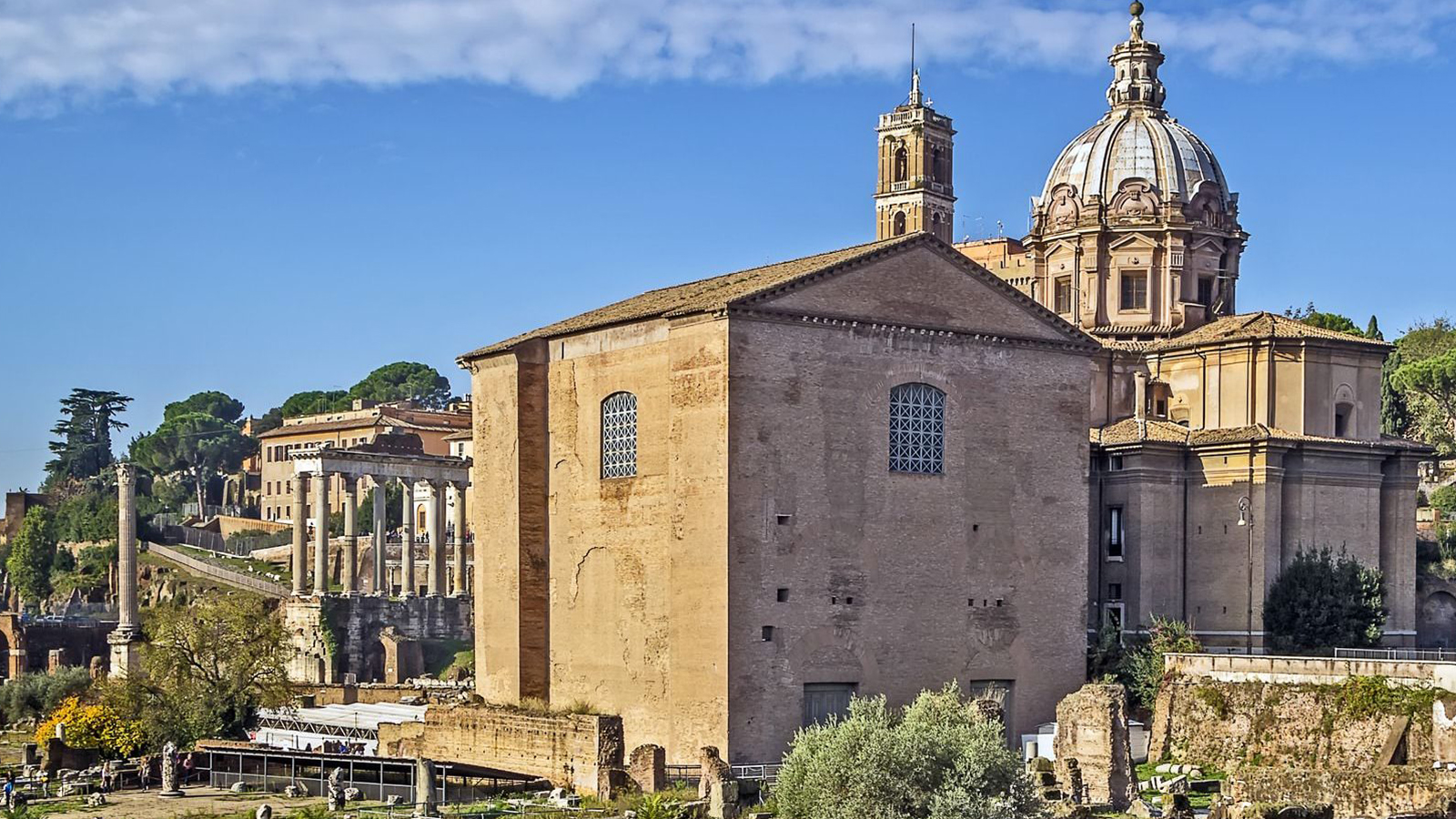The Senate: From Antiquity to Modern Times

The Curia Julia on the Roman Forum
New scholarship on the political and religious culture of the Romans has led to a deeper appreciation of the resilience and creativity of the Roman Senate as an institution that served a changing society for over 1,500 years. Remarkably, Roman senators maintained the Senate as the focus of their lives, even as they confronted military, political, social, and ecological crises. In truth, the Senate was a locus of Roman resilience, evolving to allow senators to use their resources to preserve the state even as they constantly altered the institution.
This international conference will bring together scholars from Europe, the United Kingdom, and the United States to analyze and debate the forces, peoples, and ideas that enabled Rome’s senators to use the Senate as a body that directed Rome’s political, social, and religious evolution while channeling resources and energies that enabled Rome to respond to crises.
Moving chronologically from the Republic to the early empire, and then to late antiquity and post-Roman Europe, and finally to the early modern period, a gathering of classicists, historians, legal scholars, and social scientists will debate the mechanisms and explanations for the Senate’s unique role in making Rome the ancient world’s most long-lasting and resilient society. These speakers will also consider how the memory of Rome’s senatorial successes inspired later, non-Roman adaptations of the Senate in places as diverse as eighteenth-century America and medieval Rome.
The Senate: From Antiquity to Modern Times was organized by Michele Renee Salzman (1987 Fellow, 2008 Resident) from the University of California, Riverside, and Edward Watts of the University of California, San Diego, in collaboration with the American Academy in Rome and Parco archeologico del Colosseo.
The event will be held in English. The daily schedule is:
Tuesday, October 22
Curia Iulia, Roman Forum
Entrance: Largo della Salara Vecchia (on Via dei Fori Imperiali)
2:30–7:00pm
Introduction
Michele Renee Salzman, University of California, Riverside
Welcome
Alfonsina Russo, Director, Parco archeologico del Colosseo
Peter N. Miller, President and CEO, American Academy in Rome
Session I
2:30pm
Presider: Michele Renee Salzman, University of California, Riverside
Francesca Boldrighini, Parco archeologico del Colosseo
From the Curia Iulia to the Church of St. Hadrian and Back: a brief Historical Summary
Eric Robinson, Indiana University
The Roman Senate and Greek Constitutional Forms: Oligarchic, Democratic, or Something Else?
Edward Watts, University of California, San Diego
How Appius Claudius Tried to Rig the Senate
Keynote
5:45pm
Introduction: Ed Watts
Patricia H. Labalme Friends of the Library Lecture
Gregory Koger, Director, George P. Hanley Democracy Center, University of Miami
The Senate and the People of America
Reception
7:00pm
Wednesday, October 23
American Academy in Rome
Via Angelo Masina, 5
9:00am–6:00pm
Welcome
Aliza S. Wong, Director, American Academy in Rome
Session II
9:00am
Presider: Pierfrancesco Porena, Università degli Studi di Roma Tre
Giovanni Cecconi, Università degli Studi di Firenze
Senate and Politics in the Correspondence between Marcus and Quintus Cicero
Barbara Del Giovane, Università degli Studi di Firenze
“In conventum senatorum”: Presence, Evolution, and Reaction of the Senate during the Civil Wars; a Perspective from Cicero’s Letters
Break
10:45–11:00am
Session III
11:00am
Presider: Rita Lizzi Testa, Università di Perugia
John Weisweiler, Ludwig-Maximilians-Universität München
“lectis undique optimis viris”: Provincialisation and Elite Competition in the Flavian and Antonine Senate
Oliver Hekster, Radboud University
A Roman Senate for a Global Empire? Senators in a Connected World
Break
1:00–2:30pm
Session IV
2:30pm
Presider: Marco Maiuro, Università degli Studi di Roma, La Sapienza
Elizabeth Digeser, University of California, Santa Barbara
Tensions in Rome: Plotinus and the Third-Century CE Roman Senate
Michele Renee Salzman, University of California, Riverside
The Legacy of Constantine: The Senate in the Long Fourth Century
Break
4:15–4:30pm
Session V
4:30pm
Presider: Umberto Roberto, Università di Napoli Federico II
Silvia Orlandi, Università degli Studi di Roma, La Sapienza
The Senatorial Inscriptions of the Colosseum: Toward a Digital Prosopography
Rita Lizzi Testa, Università degli Studi di Perugia
Theoderic, the Roman Senate, and the Pope
Reception
6:15pm
Thursday, October 24
American Academy in Rome
Via Angelo Masina, 5
9:00am–1:00pm
Welcome
Caroline Goodson, Andrew W. Mellon Humanities Professor, American Academy in Rome
Session VI
9:00am
Presider: Caroline Goodson, American Academy in Rome
Fabrizio Oppedisano, Scuola Normale Superiore, Pisa
Historiographic Myth of the Roman Senate in the Middle Ages
Cécile Troadec, Centre Roland Mousnier, Sorbonne Université; and Laboratoire Universitaire Histoire Cultures Italie Europe (LUHCIE), Université Grenoble Alpes
Tightrope Walkers into a New World: The End of the Senate (from 1378 to Mid-Fifteenth Century)
Caroline Winterer, Stanford University
The Senate of Rome—and Carthage: Influences on the US Founding
Break
11:15–11:30am
Concluding Remarks
11:30am
Christopher Kelly, Corpus Christi College, University of Cambridge
Discussion
12:00pm
Tuesday, October 22–Thursday, October 24, 2024
For access to the Academy, guests will be asked to show a valid photo ID. Backpacks and luggage with dimensions larger than 40 x 35 x 15 cm (16 x 14 x 6 in.) are not permitted on the property. There are no locker facilities available. You may not bring animals (with the exception of seeing-eye/guide dogs).
The Academy is accessible to wheelchair users and others who need to avoid stairs. Please email us at events@aarome.org if you or someone in your party uses a wheelchair or other mobility devices so that we can ensure the best possible visitor experience. If you are someone with a disability or medical condition that may require special accommodation, please also email us at events@aarome.org.